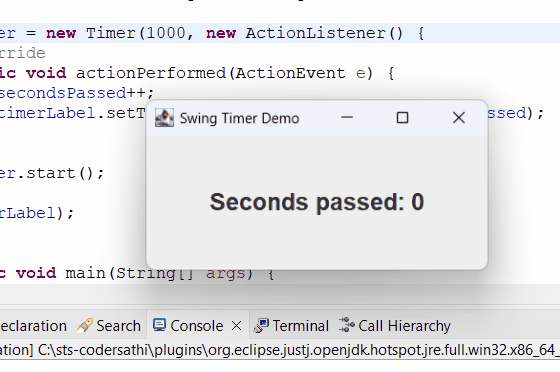Swing Timer is a part of the Java Swing library. It offers a simple way to perform tasks repeatedly with a defined delay between each execution. This functionality is especially useful for scenarios when updating live data, creating animations, or scheduling periodic checks.
Following is a hands-on example demonstrating how to utilize Swing Timers:
import java.awt.Font;
import java.awt.event.ActionEvent;
import java.awt.event.ActionListener;
import javax.swing.JFrame;
import javax.swing.JLabel;
import javax.swing.SwingConstants;
import javax.swing.SwingUtilities;
import javax.swing.Timer;
public class SwingTimerDemo extends JFrame {
private JLabel timerLabel;
private Timer swingTimer;
private int secondsPassed;
public SwingTimerDemo() {
setTitle("Swing Timer Demo");
setSize(300, 150);
setDefaultCloseOperation(EXIT_ON_CLOSE);
setLocationRelativeTo(null);
timerLabel = new JLabel("Seconds passed: 0");
timerLabel.setFont(new Font("Arial", Font.BOLD, 20));
timerLabel.setHorizontalAlignment(SwingConstants.CENTER);
swingTimer = new Timer(1000, new ActionListener() {
@Override
public void actionPerformed(ActionEvent e) {
secondsPassed++;
timerLabel.setText("Seconds passed: " + secondsPassed);
}
});
swingTimer.start();
add(timerLabel);
}
public static void main(String[] args) {
SwingUtilities.invokeLater(new Runnable() {
@Override
public void run() {
new SwingTimerDemo().setVisible(true);
}
});
}
}
Output:
